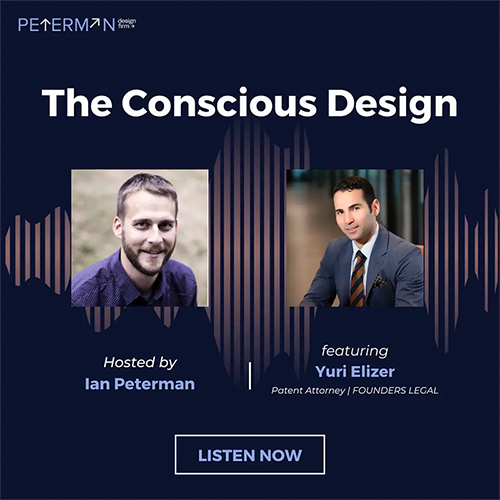AI and Intellectual Property Law
An Insightful Discussion with Yuri Eliezer
The intersection of Artificial Intelligence (AI) and Intellectual Property (IP) Law is becoming increasingly significant in the dynamic landscape of technology and innovation. This evolving field presents unique challenges and opportunities, requiring a forward-thinking approach to navigate its complexities.
Recently, Yuri Eliezer was invited to share his insights on the Conscious Design Podcast™, hosted by Ian Peterman. This podcast brings together thought leaders from various fields to discuss the future of design and its impact on our world. In this episode, Yuri delved into the transformative potential of AI in IP Law, offering a glimpse into the future of this exciting field.
Let’s dive into the key points discussed:
- AI in Patent Law: Yuri discusses the potential of AI in the field of patent law. He notes that AI can be highly disruptive in a positive way, as the practice of law is heavily language-based. AI language models can master these concepts and improve the efficiency of legal practice. However, he also points out potential issues, such as the risk of AI being used to train competitors’ AI when drafting patents.
- AI and Patent Search: Yuri explains how AI can improve the patent search process. AI can access and analyze patents published in various languages, improving the quality of the patent system by ensuring that patents granted are truly novel. He mentions his firm’s partnership with PQAI, which has developed AI for patent search technology.
- AI and Patent Examination: Yuri discusses how AI can potentially shorten the patent examination process. If an AI tool validates a patent claim before it’s filed, and the same AI examines the patent claim, the process of back-and-forth with patent examiners might be reduced, lowering costs.
- Potential Risks: Despite the potential benefits, Yuri also highlights some potential risks, such as the possibility of AI being used to train competitors’ AI, and the potential increase in non-practicing entities or “patent trolls”
- AI and Patent Obviousness: Yuri talks about the potential impact of AI on the “obviousness” standard in patent law. He suggests that the standard might need to change in instances where AI is used for patent examination, as what is “obvious” to an AI might not be obvious to a human.
- Impact on Patent Litigation and Licensing: Yuri predicts that AI could reduce the number of contested patents and therefore the amount of litigation. This could lead to more companies licensing each other’s IP rather than litigating, which could benefit small businesses with IP.
- Advice for Startups and Inventors: Yuri advises startups and inventors to conduct a patent search and file a provisional patent application. He recommends working with a professional for the search and not offshoring the process. He also suggests keeping some parts of the invention as trade secrets.
These insights provide a comprehensive overview of the potential impact of AI on the field of Intellectual Property Law, highlighting both the potential benefits and challenges.
We stand on the brink of a new era where AI could revolutionize the practice of law, particularly in the area of Intellectual Property. As Yuri Eliezer suggests, the implications are profound, from improved patent searches and drafting to potential changes in patent licensing and litigation.
However, as with any technological advancement, there are potential risks and ethical considerations that we must carefully navigate. Listen to the podcast to learn more.
- USPTO’s Semiconductor Technology Pilot Program - December 18, 2023
- First-Time Filer Expedited Examination Pilot Program (FTEEP) - October 17, 2023
- If You’re Making Your Own Board Game, How Do You Protect Your Idea? - October 10, 2023

